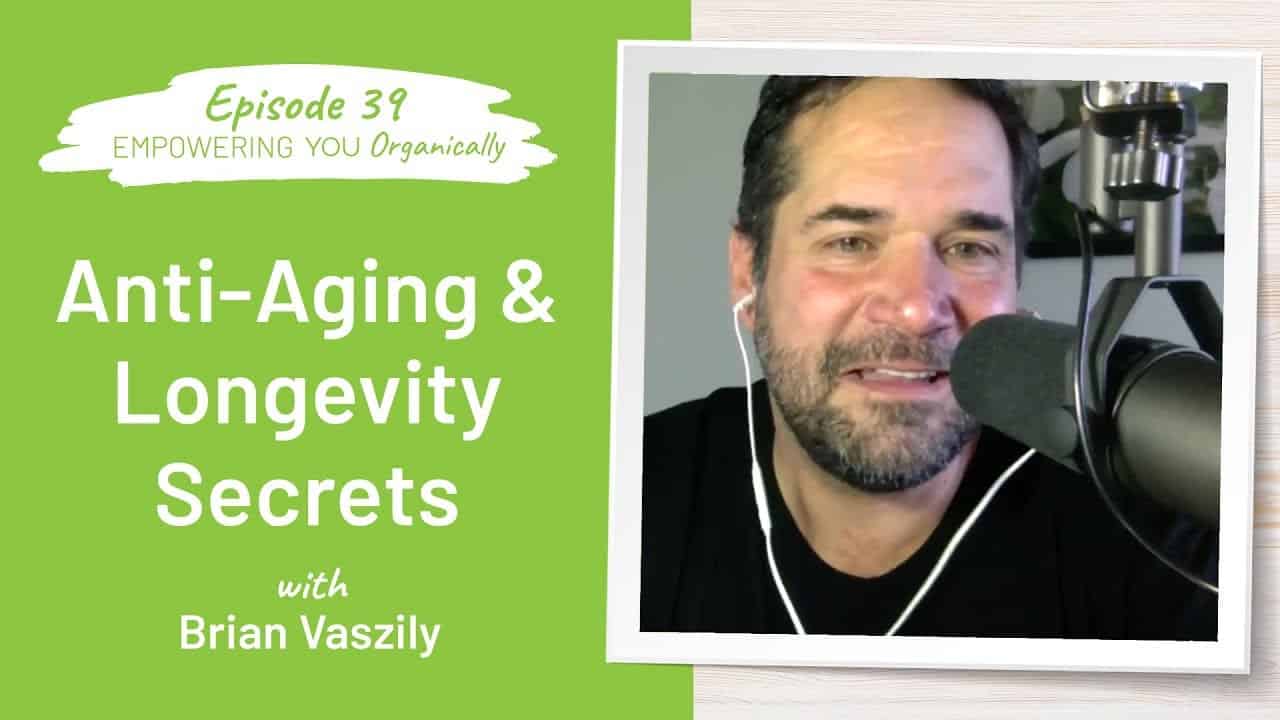Empowering you Organically – Season 6 – Episode 39
Title: Anti-Aging & Longevity Secrets
Hosts: Jonathan Hunsaker & TeriAnn Trevenen
Guest: Brian Vaszily
Description: This week we have a special guest, Brian Vaszily, from TheArtOfAntiAging.com. Listen in as Brian shares a very positive message – in terms of your physical, mental, and emotional health and wellbeing, your middle-years and beyond truly are meant to be your “best years.” And he provides people a wide range of research and solutions, along with a healthy dose of inspiration, to help ensure you start living your best years now.
* * *
About TheArtofAntiAging.com Founder Brian Vaszily
Brian Vaszily (Vay-Zlee) is a popular and outspoken advocate, author, and researcher who opposes the widespread perception that getting older is a disease that should be shunned, and who instead supports the truth that your 40s, 50s, 60s and beyond can and should be the best years of your life.
Brian is the founder and host at TheArtofAntiAging.com, where he’s already amassed a following of over 50,000 supporters for his mission, and where, in his own words… “We’re changing the very definition of ‘anti-aging’ to mean you’re against all the lies commonly associated with getting older, such as that hitting your 40s and beyond means you’re doomed to become increasingly undesirable, incapable, invisible, and past your best years.” Instead, so many people have embraced TheArtofAntiAging.com because Brian shares a very positive message – in terms of your physical, mental, and emotional health and wellbeing, your middle-years and beyond truly are meant to be your “best years.” And he provides people a wide range of research and solutions, along with a healthy dose of inspiration, to help ensure you start living your best years now.
Aging Myths
Dismiss the notion that getting older is a disease! These aging myths are so widespread and so unchallenged that they’re largely accepted as fact, just like all those ugly and demeaning myths about women once were in our culture.
- Getting older means becoming increasingly undesirable
- Getting older means becoming increasingly incapable.
- Getting older means increased pain and suffering.
- Getting older means becoming increasingly invisible.
Changes to Make What you put in your ‘being’? Whatever you feed yourself you become.
- Diet – less sugar and refined flours and more organic vegetables.
- Media – control what you allow into your mind.
- People – let go of toxic relationships and focus on positive relationships.
- Toxins – switch to clean and natural personal care and household products.
- Movement – increase your activity level throughout the day.
Where to start?
- Become aware and educate yourself.
- Don’t try to do everything at once. Pick an area and work on it.
- Avoid overwhelm by making this a lifestyle and not a quick fix.
- Consider a detox to help jump-start the process.
The Art of Aging Truth #1: Youth-Obsession and the Aging Bias are Real and Dangerous
- We live in a youth-obsessed culture that shoves people — especially women — between a rock and a hard place, setting impossible expectations on the one hand while pushing you to accept some extremely destructive myths about getting older on the other.
- This creates a seriously twisted bias against getting older, where the gold standard of life is portrayed as somewhere in the 20s, while hitting your 40s and beyond is portrayed as a downward spiral into increasing insignificance, ugliness, and misery.
Truth #2: The Lies Actually Cause You to Look and Feel Significantly Older
- Ironically and disturbingly, these ugly aging myths are actually causing people to look and feel 7 to 15 older than they should, and to die 10 to 20 years earlier than they should, as you’re about to see.
* * *
Subscribe to Empowering You Organically
Never miss an episode!
APPLE PODCASTS SPOTIFY GOOGLE PODCASTS
–
Episode 39 – Anti-Aging & Longevity Secrets




